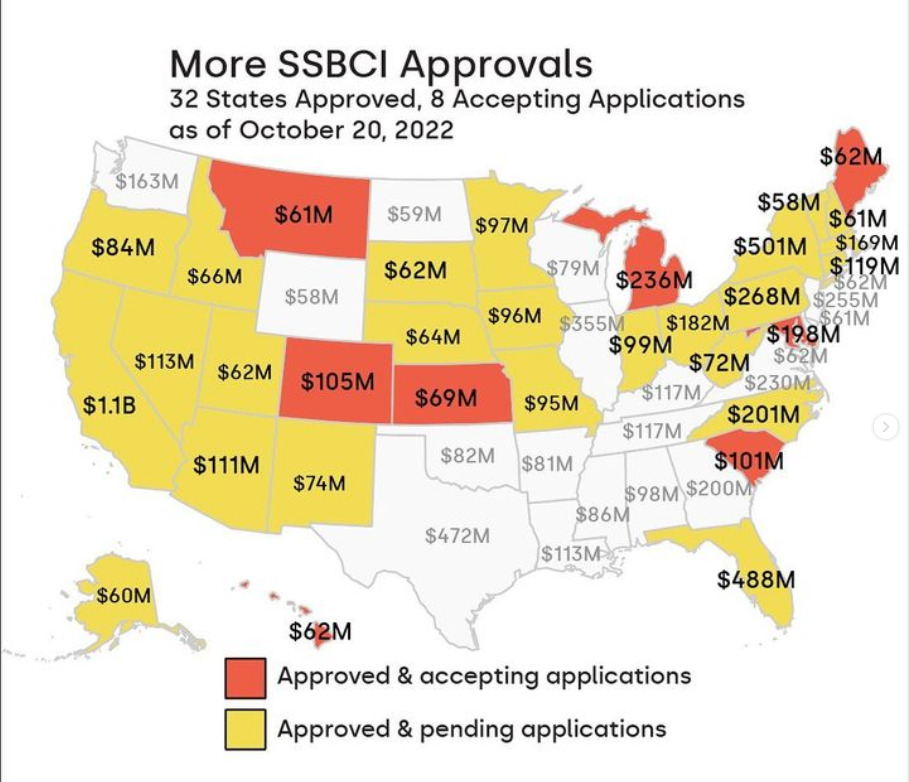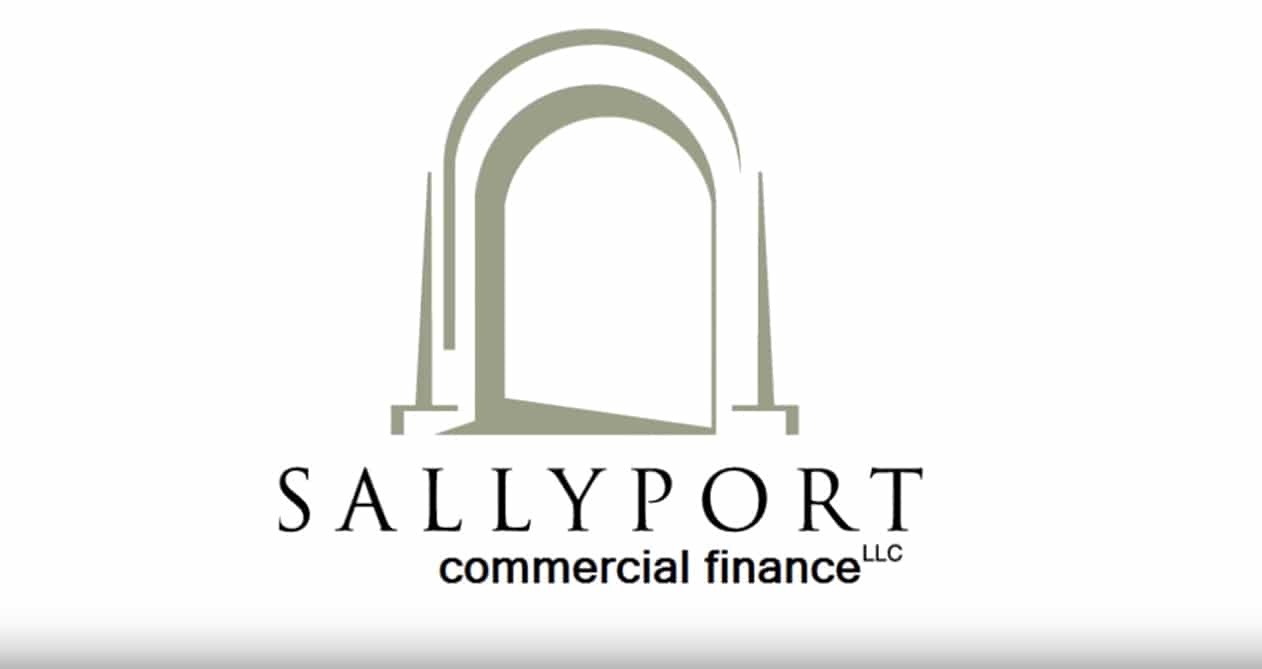Articles & Videos
Treasury Announce $1 Billion Small Business Support for 11 More States

U.S. Department of the Treasury recently announced an additional $1 billion in small business support in a further 11 states that may have been overlooked and underserved previously when it comes to securing growth capital.
The funds have been agreed under the ‘American Rescue Plan’ which expands and reinvigorates the State Small Business Credit Inititiative (SSBCI), established in 2010 to provide entreprenenurs and small business owners with the access to capital they need to survive. The states to benefit from this increased funding will include;
- Alaska, Idaho, Iowa, Massachusetts, Minnesota, Missouri, Nebraska, Nevada, New Mexico, Ohio and Utah.
Whilst there are similarities in some of the programs that will be utilized, the states will use the funds to address their specific small business finance needs. Here are some highlights of how those states will be spending the monies to promote small business growth and innovation…
Alaska
Alaska is set to receive $59.9 million in funding, directed to lenders and will split the funds over 4 programs;
$32 Million for the Alaska Loan Guarantee Program (LGP) – To provide funding to small businesses whose revenues are below what they would normally generate in a typical year, making it difficult for them to access traditional finance products.
$15.9 Million for the Loan Participation Program (LPP) – To allow more businesses access to loans at lower interest rates and extend terms to keep payments low and therefore allowing them to concentrate on recovery and revenue generation.
$10 Million to Equity and Venture Capital (VC) Program – Allowing high-growth, high potential businesses to access the capital they need.
$2 Million to the Collateral Fund Program – This will allow lenders greater scope to approve loans for higher risk businesses, using the funds to offset their risk.
It’s hoped that the funds will greatly benefit rural communities who struggle to attract funding for industries such as commercial fishing, manufacturing and tourism which typically require high upfront costs.
Idaho
Idaho is approved for up to $65.6 million of the federal funding split over a collateral support program (CSP) at $39 million and loan participation program (LPP) of $26 million.
The CSP makes up the primary part of Idaho’s funding and will be used to increase access to capital for underserved areas where there is already an established presence of Community Development Financial Institutions (CDFI) providing support and revitalization to distressed communities.
Iowa
Iowa’s $96.1 million in funds have been approved by the treasury based on a plan of investment coming from the Iowa Economic Development Authority (IEDA) – more details can be found in IEDA’s press release.
The funding will be split over four programs, two VC related to which $53 million has been allocated to encourage high potential, early stage startups to remain in the area through access to low-interest loans amongst other incentives.
The other two programs will be a $15.1 million CSP and a $28 million LPP to improve access to funding for Iowa’s small manufacturers to be able to invest in automation technologies and increase productivity.
Massachusetts
Approved for up to $168.5 million in federal funding, Massachusetts small businesses will benefit from five programs; two loan participation programs, two loan guarantee programs and a venture capital program.
A large part of the funds ($30 million) will go towards the support of Massachusetts based startup technology companies, administered through MassVentures.
Visit the Massachusetts government website to learn more about all the business finance programs available.
Minnesota
Minnesota will operate six programs with their $97 million federal funding. These programs cover a combination of financial services for Minnesota businesses needing to invest into machinery, equipment or software to enable automation, VC capital for early-stage businesses in specific sectors (I.T., cleantech and manufacturing for example) and VC capital in the form of co-investment into startups alongside private investors.
The Minessota Employment and Economic Development website features comprehensive details of the resources on offer to startup and small businesses in the state.
Missouri
Missouri’s $95 million in funding will be issued in three lots and used to stimulate entrepreneurial activity and generate economic growth in the state. Several different programs will be operated through the Missouri Technology Corporation, collaborating with private investors to put VC finance in the hands of high-growth technology corporations that can create a big economic impact and grow employment in the area.
Nebraska
Nebraska will use $64 million in funds equally across two programs; $32 million for a loan participation program providing companion loans for up to 50% of a principal loan amount through the Nebraska Growth Loan Fund and $32 million for a direct investment, venture capital program, supporting businesses through the Nebraska Seed and Development Fund.
Nevada
Nevada will operate five programs to account for their over $112 million in funding including a collateral support program, three loan participation programs and a VC program. Over half of the funds will be allocated to the LPPs, a move that the state say will result in the creation of over 2,000 jobs.
Small businesses and manufacturers feature heavily in these plans with the funding going to support debt financing through the state participation in loans over $250,000 from commercial banks and other lenders and bolstering the state’s CDFI financing through particpation in loans of less than $250,000.
New Mexico
A collateral support program and an equity capital program will be rolled out in New Mexico, with up to $74.4 million to attract new equity / VC funding for small businesses.
Ohio
Ohio will initially receive approximately $52.4 million out of a total $182.3 million funding to support socially and economically disadvantaged individuals, very small businesses, and early-stage, technology-based companies.
Lt. Governor Jon Husted said…
“We’re going to use these funds to help businesses grow so they can hire more employees. A strong base of small businesses and tech companies is crucial to Ohio’s future.”
The Department of Development will administer the SSBCI program in Ohio through the Minority Business Development Division and the Ohio Third Frontier, splitting the funding among four programs that are expected to be available by the end of 2022:
• The Community Development Financial Institutions (CDFI) Loan Participation Program will provide loans to socially and economically disadvantaged individuals, very small businesses, and businesses located in CDFI tracts;
• The Ohio Collateral Enhancement Program will provide collateral on small business loans made by financial institutions to allow small businesses to access loans that otherwise would have been denied;
• The Ohio Venture Fund will provide capital to investment funds to invest in early-stage, tech-based companies;
• The Early-Stage Focus Fund will complement the existing Ohio Third Frontier Pre-Seed Fund to support funds that target investments to early-stage, tech-based companies in underserved communities and populations.
Source Ohio Department of Development.
Utah
$69 million will be available to small businesses across three programs including a loan participation program, loan guarantee program and a capital access program. Small business borrowers will gain improved access to credit with companion loans under the LPP and benefit from lower blended interest rates. Lenders will be able to extend credit to more small businesses under the LGP which gives them the reassurance of loan guarantees up to 80%.
Further information on these programs may be accessed on the website for the Utah Governor’s Office of Economic Opportunity.
Entrepreneurship Takes Center Stage
More Americans than ever are starting their own businesses and those businesses are creating more jobs than ever which is vital for the U.S. economy. Expansion of the SSBCI to include more rural and often neglected states for small business finance will surely help in supporting those communities deal with large-scale loss of industry and jobs, labor shortage and invite even greater entrepreneurship as business owners can access the finance they need to fund growth and innovation.
These funds are also likely to have a halo effect, attracting more and more private investment into these states.
Of course, the challenge is how the states manage the efficient distribution of these funds considering they won’t be going to small businesses directly but administered through lenders or non-profit entities such as existing Community Development Investment Funds (CDFIs), community banks and economic development organizations. We would hope that the application process is straightforward and transparent, however, on our first glance at some of the states that have been approved, the application process is not without its challenges.
We’re sure that lower-cost funding through the SSBCI will be welcome news for founders and entrepreneurs of minority-owned and capital-scarce businesses in these states, however programs, eligibility and the application process and documentation required will all vary by state. In many cases, the oneness will be on business owners to select a private lender from those participating to provide them with commercial finance before starting the process which seems counterintuitive to the goal of more equitable lending and what happens then if that lender isn’t the right fit? Of course, the program is also still rolling out as well and many states are not yet open for applications, including Texas and Illinois among others.

If your state is not yet accepting applications, it’s worthwhile having all your documentation ready to go as it’s ‘first come, first served’ for these funds. Tax returns, business plans and projections will generally be required to apply.
If you need more help in determining your finance options and are finding the information overwhelming, don’t hesitate to reach out to the Sallyport Commercial Finance team on 832-939-9500 or get in touch through our website.
Search
News
Q1 2025 Funding Highlights
We’ve had a strong start to Q1, not just here in Scotland but across the UK – we’re proud to…
Read MoreQ4 2024 Funding Highlights
With 2024 all wrapped up, we’re proud to share a snapshot of the incredible businesses we’ve had the privilege to…
Read MoreArticles
A to Z of Small Business Finance and Credit Terms
Most small business owners go into business to follow a passion or create freedom in their career and lives. It’s…
Read MoreApparel Purchase Order Financing – Perfectly Coordinated Funding
The apparel industry has many nuances, cash flow constraints being one of the most significant and challenging. Long delays between…
Read MoreVideos
AG Machining Client Testimonial
AG Machining Client Testimonial
View Now




